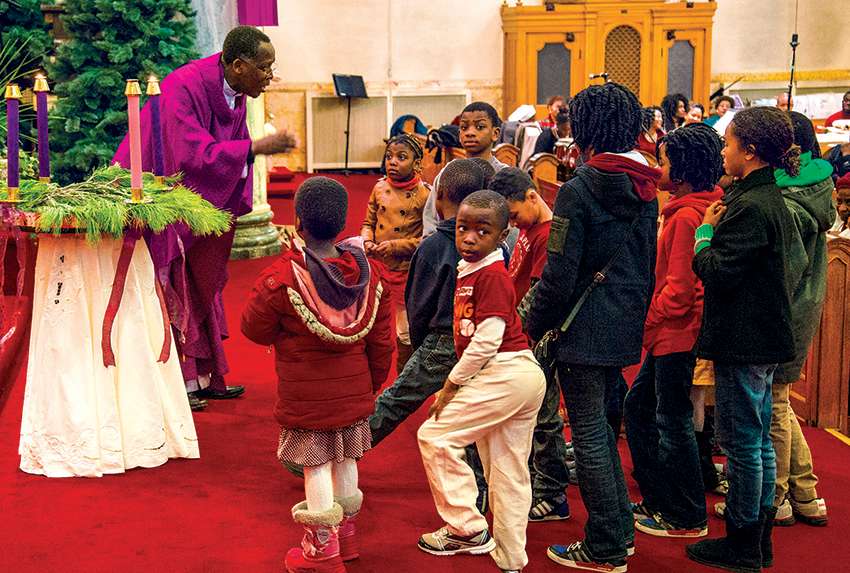“If you were to ask any bishop today who has an important urban community, they will tell you that the points of vitality in their diocese will be urban parishes with large immigrant populations,” said Cathy Clifford, theology professor at Ottawa’s Saint Paul University.
An Angus Reid poll for Cardus in January found that Canadians born outside the country are more religiously inclined than Canadians as a whole. Immigrants are far less likely to report no religious affiliation than the general Canadian population. Angus Reid categorized 18 per cent of its immigrant survey respondents as religious nones, unaffiliated with any formal religion. That’s just less than half the 34.6 per cent of all Canadians who told census takers in 2021 that they are not religious.
The Angus Reid survey found that 33 per cent of immigrants already here identify as Catholics. That translates into one out of every eight Canadian Catholics (13 per cent) who are immigrants.
If Canada as an immigrant nation represents an opportunity for growth and new life for the Church, the question is whether parishes and Catholic institutions are ready to welcome them, Clifford said.
“I’m not sure that we have adapted adequately the pastoral life of our communities to receive the kind of enrichment that new immigrants bring to our communities,” she said.
The federal government’s new immigration levels plan, released Nov. 1, will see this country bring in 465,000 new permanent residents in 2023, 485,000 in 2024 and 500,000 in 2025. Ottawa’s new immigration ambitions represent a continuation of a policy that brought in 405,000 in 2021 and is on track to welcome 431,000 this year.
Of course the government is not bringing in immigrants to help out the Catholic Church. It’s part of an economic plan to bring in more workers to balance with massive numbers of Canadians marching off into retirement. A Business Council of Canada survey in June found that 67 per cent of businesses had cancelled or delayed major projects because they couldn’t find enough of the right kind of workers. Another 30 per cent had to relocate work outside of Canada.
An Environics Institute and Century Initiative survey in October found that seven in 10 Canadians express support for current immigration levels — the largest majority recorded on Environics surveys in 45 years.
In Halifax, Atlantic School of Theology professor David Deane would like to see parishes do more to adapt their liturgies and parish life to reflect the religious practice of new Canadians.
“Once a month at least, have a Mass in both the style and the language of a non-English speaking, non-Canadian culture,” he suggests. “We do have an African Mass once a month here in Halifax. We have a good amount of people from Nigeria with a Nigerian priest. It’s an entirely different vibe.”
Clifford warns of the dangers of passively waiting for the pious Catholics fresh off the boat to just show up. The Synod on Synodality has shown that many Catholics worry that their Church is not welcoming, she said.
“Lots of people are feeling not welcomed in our communities today. So we have to ask ourselves, how do we receive others as they are?” she said. “Receiving people from other cultures, from other spiritualities, with other sensibilities — I think that’s an important question to ask our parish and diocesan communities in the way we receive new immigrants.”
While immigrants to Canada may generally be more religious than the rest of us, there are many who are free agents, including those who grew up in officially atheist societies such as China.
“Particularly in Ontario, where you’ve got massive amounts of immigration from places like China or places that are very secular, there should be ways of doing outreach to new people,” said Deane. “But it doesn’t seem to be on the radar. But it should be.”
One important form of outreach has been Catholic welcome of refugees.
“In Ottawa here, Catholic Immigration Services sets the standard for what goes on in the region here,” said Clifford. “It’s exemplary, what we’re doing to welcome immigrant communities. But I’m not sure that that filters down always to the parish level.”
Catholics across the country will continue to be called on to welcome refugees to Canada. The new levels plan envisions a drop in the number of refugees resettled in Canada from 76,305 next year to 72,750 in 2025. Within this number, Ottawa is cutting drastically the number of refugees it sponsors through the Government Assisted Refugee program, from 23,550 in 2023 to 15,250 in 2025. That leaves the Privately Sponsored Refugees program, the majority of these sponsored by faith communities, to pick up the slack. The PSR program will grow incrementally from 27,505 next year to 28,250 in 2025.
The numbers of refugees are dwarfed by economic class immigrants (241,850 this year, growing to 301,250 by 2025). Family reunification accounts for 105,000 immigrants expected this year. This will grow to 118,000 by 2025.
Clifford warns that ethnically-based personal parishes can be a trap — strong and alive for the first generation of immigrants then dwindling as their children and grandchildren take over.
“Second- and third-generation Canadians are less interested in maintaining that strong cultural identification. They’re interested in being more broadly assimilated,” she said. “They might not maintain the language of their parents. So there’s a danger in defining parish communities on ethnic and linguistic lines, always.”

